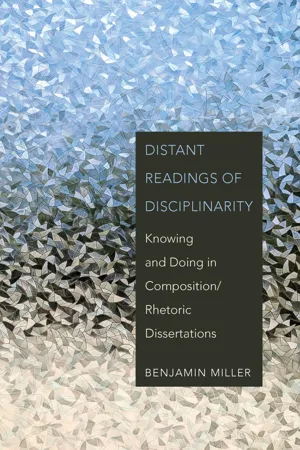
Distant Readings of Disciplinarity
Knowing and Doing in Composition/Rhetoric Dissertations
- English
- ePUB (mobile friendly)
- Available on iOS & Android
Distant Readings of Disciplinarity
Knowing and Doing in Composition/Rhetoric Dissertations
About This Book
In Distant Readings of Disciplinarity, Benjamin Miller brings a big data approach to the study of disciplinarity in rhetoric, composition, and writing studies (RCWS) by developing scalable maps of the methods and topics of several thousand RCWS dissertations from 2001 to 2015. Combining charts and figures with engaging and even playful prose, Miller offers an accessible model of how large-scale data-driven research can advance disciplinary understanding—both answering and amplifying the call to add replicable data analysis and visualization to the mix of methods regularly employed in the field.Writing studies has long been marked by a multitude of methods and interlocking purposes, partaking of not just humanities approaches but also social scientific ones, with data drawn from interviews and surveys alongside historical and philosophical arguments and with corpus analytics in large-scale collections jostling against small-scale case studies of individuals. These areas of study aren't always cleanly separable; shifting modes mark the discipline as open and welcoming to many different angles of research. The field needs to embrace that vantage point and generate new degrees of familiarity with methods beyond those of any individual scholar.
Not only a training genre and not only a knowledge-making genre, the dissertation is also a discipline-producing genre. Illustrating what the field has been studying, and how, Distant Readings of Disciplinarity supports more fruitful collaborations within and across research areas and methods.
Frequently asked questions
Information
Table of contents
- Cover
- Title Page
- Copyright Page
- Contents
- Foreword
- Acknowledgments
- Opening
- 1 Disciplinary Anxiety and the Composition of Composition
- 2 So What’s Your Dissertation About? Subject Expertise in the Aggregate
- 3 How Do You Know? Unevenly Distributed Dappling in Dissertation Methods
- 4 But Doesn’t Everyone Know about Writing? Distinguishing RCWS from Allied Fields
- 5 A Map Is Not a Manifesto
- Appendix A: Pre-Processing Steps and Parameters for Topic Modeling
- Appendix B: Calculating Term Frequency * Inverse Topic Frequency (TF-ITF)
- Appendix C: Complete List of Topic Keys, Assigned Labels, and Ranks
- Notes
- Works Cited
- Index